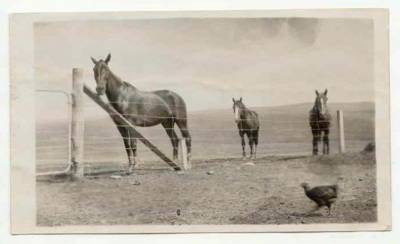Homesteading

"Men like my father cannot die. They are with me still -- real in memory as they were in flesh, loving and beloved forever. How green was my valley then."
- Roddy McDowell, as Huw Morgan in "How Green Was My Valley," Twentieth Century Fox, 1941
My great-grandfather took this photograph. The back of it reads simply, “Longbout at the gate & two 4 yr old Mares in 1916.” It’s part of what I think is a beautiful series of photos he took when he and his wife were homesteading in a little non-descript Saskatchewan town. The photographs depict endless grass-less prairie, with my great-grandmother and their neighbours in dusty clothing, a few animals, sod and clapboard buildings, reflecting the harshness and disparity of settling an unyielding and barren land. Some of the photos remind me much of Dorothea Lange's Migrant Mother
I particularly love this photo in the series, not only because of the beauty of the horses, the faded and fuzzy spots of focus, the background that simply is Saskatchewan, and the sheer motion that is in the running chicken, but because of what it represents. From my Gramma I have learned of the love my great-grandfather had for his horses, they were always one thing that he was proud of. These horses would have been their most valuable possession.
My great-grandparents moved from Ontario to Saskatchewan to start a new life and create a place that could be called home. But from what I understand from my Gramma, they only stayed there a year. They returned to Ontario for a couple of years, and then later moved to Manitoba and started out once again. That time, they succeeded, and lived the majority of the rest of their lives there.
Unfortunately, my great-grandfather is a man I never got to meet, he died six months before I was born, at age eighty-eight. He was a man of courage and determination, love, and a gentle spirit. He was orphaned at a young age, lost his younger and only brother not too long after, and had to quit school after the third grade in order to work. When my grandfather died, he spent the next year teaching my Gramma to farm, in a time when women were never the breadwinners. When he died, my Gramma says she lost her best friend. She missed his daily phone conversations when he would call and say “So how are things in the country today?”

No comments:
Post a Comment